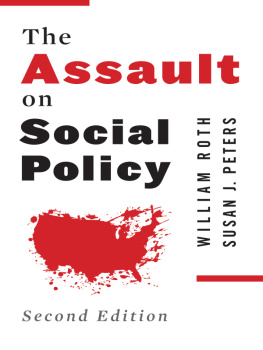THE ASSAULT ON SOCIAL POLICY
SECOND EDITION
The Assault on Social Policy
SECOND EDITION
William Roth and Susan J. Peters

COLUMBIA UNIVERSITY PRESS NEW YORK
COLUMBIA UNIVERSITY PRESS
Publishers Since 1893
New York Chichester, West Sussex
cup.columbia.edu
Copyright 2014 Columbia University Press
All rights reserved
E-ISBN 978-0-231-53797-1
Library of Congress Cataloging-in-Publication Data
Roth, William, 1942
The Assault on social policy / William Roth and Susan J. Peters. Second Edition.
pages cm
Includes bibliographical references and index.
ISBN 978-0-231-16006-3 (cloth : alk. paper) ISBN 978-0-231-16007-0 (pbk. : alk. paper) ISBN 978-0-231-53797-1 (e-book)
1. United StatesSocial policy1993 2. Business and politicsUnited States. 3. CorporationsPolitical activityUnited States. I. Title.
HN65.R66 2014
303.372dc23
2013048914
A Columbia University Press E-book.
CUP would be pleased to hear about your reading experience with this e-book at .
Cover design: Elliot Strunk
References to websites (URLs) were accurate at the time of writing. Neither the author nor Columbia University Press is responsible for URLs that may have expired or changed since the manuscript was prepared.
DEDICATED TO THE 99 PERCENT
CONTENTS
THE ASSAULT ON SOCIAL POLICY is even more relevant today, in its second edition, than it was ten years ago. In the first edition, William Roth investigated poverty, welfare, health, the social security system, and disability in children. I was impressed then and I am impressed now by his analysis of economic politics, the role of corporations in shaping public life, the media, and the globalization of our economic policies. Roth and Susan Peters contribute to elevating the debate regarding social policy at the present critical historical hour.
Since William Roth wrote the first edition of The Assault on Social Policy, America has lived through two major wars in Iraq and Afghanistan and suffered the most sustained systematic economic downturn since the Great Depression, which has left millions upon millions of Americans without jobs and millions of others without decent housing.
The progressive approach that Roth and Peters argue for has been less successful than many Americans had hoped for with the election of President Obama and a strong progressive presence in the U.S. House of Representatives. We have witnessed an unprecedented assault, at least in my lifetime, on the public policies needed to assure a decent society and hopeful future for most Americans. With the financial assistance of some of the wealthiest people in America, a bitter right-wing reaction and full-scale assault on the rights of workers, teachers, women, and the poor has risen to the surface. Regrettably, the first edition of this book has proven all too painfully prescient. When President Obama said a couple of weeks after his first inaugural that the Republicans had a choice between cooperating with him or staying at home and listening to Rush Limbaugh, many of them chose the latter.
Now, at a time when the United States has the most unequal distribution of wealth, there should be no talk of tax breaks for the extremely wealthy; instead we should be using the hundreds of billions saved to repair the crumbling of our infrastructure. The attempt to end, even by way of phasing out, Social Security as we know it, the most successful social policy in the modern history of America, must be exposed for what it is: a virtual contempt for the dignity of Americas older population as well as future generations. Every actuarial study has demonstrated that Social Security, which did not contribute one dime to the national debt, is being falsely blamed and in fact is solvent for at least the next two decades. Furthermore, we should invest in making a transition of our energy system away from fossil fuels toward sustainable energy sources. This will create a significant number of jobs, help to achieve energy independence, and cut down on greenhouse gas emissions.
Roth and Peters offer a positive vision for helping to achieve a progressive social democracy. We cannot afford to give in to the assault on social policy by the forces of reaction. What Roth and Peters achieve is a basic understanding that economic policy is conditioned on the morality of social democracy. In my view, they have written an impressive book that should be read by all members of Congress and anyone who is concerned with the well-being of our basic democratic institutions.
This book should be analyzed and debated, which is what the authors are asking us to do. At a time when wealthy corporate interests have more power than they have ever had, it is altogether timely that we undertake a thorough evaluation of aspects of society in our struggle to make our nation and the world a more just and democratic place.
Senator Bernie Sanders
Independent, Vermont
WILLIAM ROTH ACKNOWLEDGES THE PASSION and dedication of Susan Peters, without whom this second edition would have been impossible. Among many others Professor Roth acknowledges the outstanding leadership of his dean, Katherine Briar Lawson. He acknowledges the tireless loyalty of Ellen Burke. His son Daniel has been a wise teacher. As always, Richard Sugarman has been an invaluable moral compass. John Gliedman, Gary Saxonhouse, and Richard deLone were valued teachers and friends. Their premature deaths have left a painful void.
Susan Peters acknowledges the privilege of collaborating with William Roth and his unfailing support and encouragement. She thanks her many doctoral studentsespecially Jeanne Anderson-Tippett, JoDell Heroux, Nai-Cheng Kuo, and Laura Ann Oliverfor stimulating intellectual exchanges and lively engagement in projects across the years and around the world. Their assistance in data searches, note taking, reference checking, and organization of files were critical for bringing this second edition to fruition. Joy and Tom Peters remain her mainstay and anchor throughout lifes challenges.
THE FIRST EDITION of this book marked the beginning of the third millennium with the dramatic lowering of a Waterford crystal ball in Times Square on December 31, 1999. As the Center of the World, Times Square had emerged from years of tawdriness into a new era of glitz symbolized by digitally triggered billboards. Pornography and prostitution had slunk away. Bright multiplexes, worthy of the best suburban mall, had replaced dingy urban movie theaters. Mickey Mouse and other beloved Disney characters had taken over from the rats and roaches. Predictions of Y2K terrorism never materialized because appropriate precautions had been taken; because, as was generally felt, there was less cause for fear; because of luck; or perhaps all the above. Despite what the more puritanical may have perceived as unruliness and lawlessness, most saw the revelry and flaunting of liquor laws as exuberance befitting the occasion, which is how the police, expecting the best but prepared for the worst, also seemed to perceive it.
In pre-millennium but post-television New Years celebrations, the dropping of the ball in Times Square commemorated the New Year even for those who were not present. Hundreds of thousands at distant gatherings and parties paused before the television set to see the ball drop.
What holds for any new year held brilliantly for the singular new year that marked the millennium, not least because of the revolution in telecommunication technologies that made worldwide celebrations transmissible for all to see (most excellently by CNN, whose twenty-four-hour news cycle, global reach, and transformation of local occurrences into global events had transformed Ted Turner, CNN founder, from an eccentric into a billionaire and visionary). The millennial inauguration was a fabulous demonstration of new technologies and their connection to us all. Countries around the globe not only applauded the new millennium but celebrated it as a superbly choreographed television event. (Only cynics could have regarded the occasion as an advertisement for third-millennium tourism.) People had their favorites, of course, such as the sound-and-light show at the Egyptian pyramids.
 COLUMBIA UNIVERSITY PRESS NEW YORK
COLUMBIA UNIVERSITY PRESS NEW YORK










